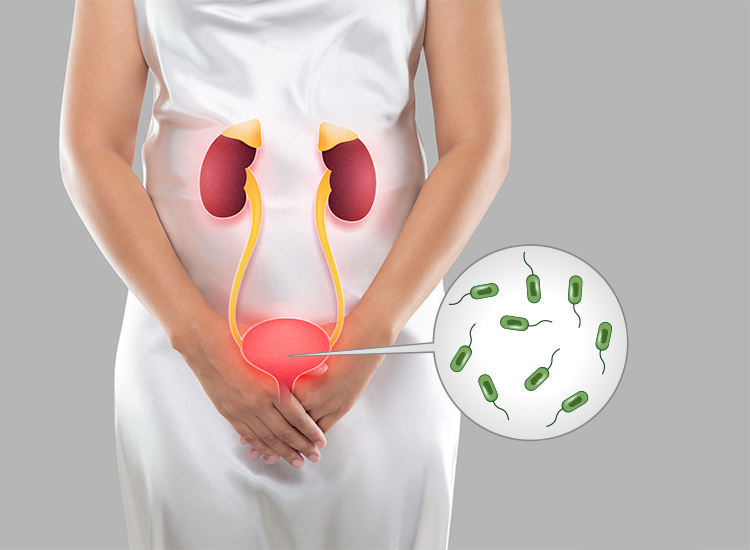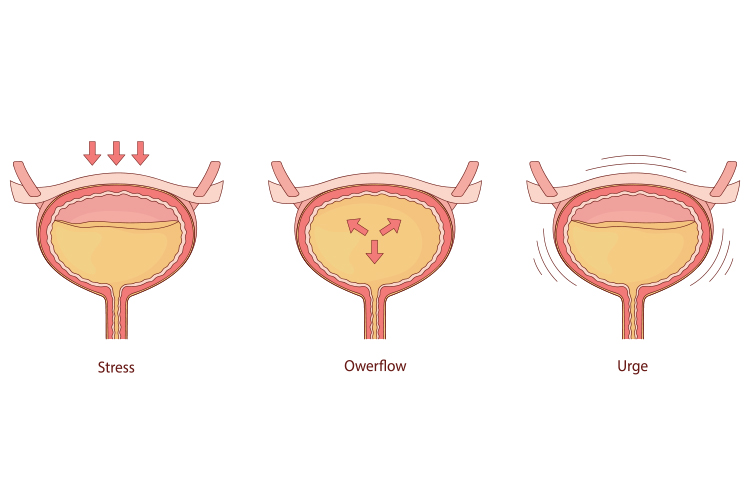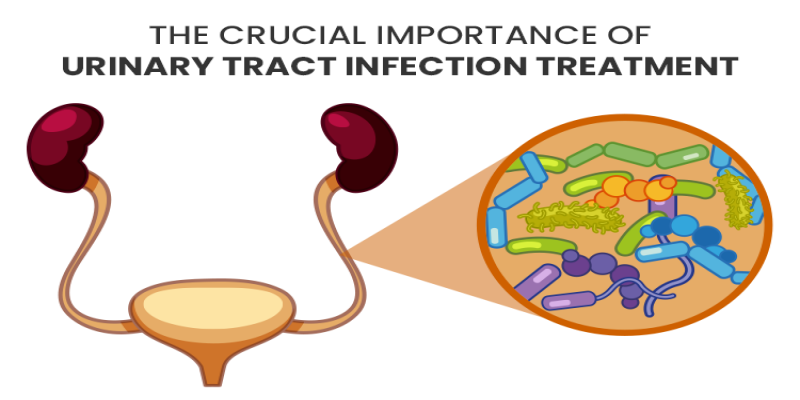Urinary tract infections (UTIs) are common bacterial infections that can affect any part of the urinary system, including the kidneys, ureters, bladder, and urethra. The most common cause of UTIs is Escherichia coli (E. coli), a type of bacteria normally found in the digestive tract. These bacteria can enter the urinary tract through the urethra and begin to multiply in the bladder. Women are more susceptible to UTIs due to their shorter urethra, which allows bacteria easier access to the bladder. Other risk factors include sexual activity, certain types of birth control, menopause, and urinary tract abnormalities. Symptoms of UTIs can vary but often include a strong, persistent urge to urinate, a burning sensation when urinating, passing frequent, small amounts of urine, cloudy or strong-smelling urine, pelvic pain in women, and rectal pain in men. If the infection spreads to the kidneys, additional symptoms may include fever, chills, nausea, vomiting, and pain in the upper back and side.
Procedures & Interventions
Antibiotics are the primary treatment for UTIs and work by killing the bacteria causing the infection. Commonly prescribed antibiotics include trimethoprim-sulfamethoxazole, nitrofurantoin, and ciprofloxacin. The specific choice depends on the type of bacteria identified and the severity of the infection. Patients must complete the full course to prevent antibiotic resistance and ensure complete recovery.
Over-the-counter pain relievers like phenazopyridine or ibuprofen are often recommended to ease symptoms like burning, discomfort, and abdominal pain. Phenazopyridine specifically targets urinary tract discomfort, providing temporary relief while the antibiotics address the infection. However, pain relievers don’t treat the infection itself.
Drinking plenty of water helps flush out bacteria from the urinary tract by promoting frequent urination. Staying hydrated dilutes urine, reducing irritation and discomfort during urination. Adding cranberry juice (unsweetened) to your diet may also help prevent bacterial adhesion to the urinary tract lining, although it’s not a standalone cure.
Cranberry juice or supplements are often recommended as a preventive measure for recurrent UTIs. They contain compounds that may prevent bacteria, particularly E. coli, from adhering to the urinary tract walls. While scientific evidence is mixed, some studies suggest cranberry products can be beneficial, especially for women prone to UTIs.
Probiotics, especially those containing Lactobacillus species, help restore the natural balance of good bacteria in the gut and urinary tract. They may reduce the risk of recurrent UTIs by maintaining a healthy microbiome and preventing the overgrowth of harmful bacteria. Probiotics are available in foods like yogurt or as supplements.
For postmenopausal women, low estrogen levels can increase susceptibility to UTIs. Topical estrogen creams or vaginal rings may help restore the natural defense mechanisms of the vaginal and urinary tract lining. This therapy is often prescribed under medical supervision to prevent recurring UTIs.
For individuals with frequent UTIs, low-dose antibiotics taken for an extended period may be prescribed. This approach, known as antibiotic prophylaxis, aims to prevent infections before they start. The type and dosage of antibiotics are carefully selected to minimize side effects and antibiotic resistance.
Proper catheter care is crucial for preventing UTIs in individuals who use them. This includes maintaining strict hygiene, changing catheters regularly, and ensuring proper insertion techniques. Healthcare providers may also consider intermittent catheterization or alternative catheter types to reduce infection risk.
In rare cases where structural abnormalities contribute to recurrent UTIs, surgery may be necessary. This could involve correcting issues like urinary reflux or removing blockages in the urinary tract. Surgical interventions are typically considered only after other treatments have failed to resolve recurrent infections.

Antibiotics are the primary treatment for UTIs and work by killing the bacteria causing the infection. Commonly prescribed antibiotics include trimethoprim-sulfamethoxazole, nitrofurantoin, and ciprofloxacin. The specific choice depends on the type of bacteria identified and the severity of the infection. Patients must complete the full course to prevent antibiotic resistance and ensure complete recovery.

Over-the-counter pain relievers like phenazopyridine or ibuprofen are often recommended to ease symptoms like burning, discomfort, and abdominal pain. Phenazopyridine specifically targets urinary tract discomfort, providing temporary relief while the antibiotics address the infection. However, pain relievers don’t treat the infection itself.

Drinking plenty of water helps flush out bacteria from the urinary tract by promoting frequent urination. Staying hydrated dilutes urine, reducing irritation and discomfort during urination. Adding cranberry juice (unsweetened) to your diet may also help prevent bacterial adhesion to the urinary tract lining, although it’s not a standalone cure.

Cranberry juice or supplements are often recommended as a preventive measure for recurrent UTIs. They contain compounds that may prevent bacteria, particularly E. coli, from adhering to the urinary tract walls. While scientific evidence is mixed, some studies suggest cranberry products can be beneficial, especially for women prone to UTIs.

Probiotics, especially those containing Lactobacillus species, help restore the natural balance of good bacteria in the gut and urinary tract. They may reduce the risk of recurrent UTIs by maintaining a healthy microbiome and preventing the overgrowth of harmful bacteria. Probiotics are available in foods like yogurt or as supplements.

For postmenopausal women, low estrogen levels can increase susceptibility to UTIs. Topical estrogen creams or vaginal rings may help restore the natural defense mechanisms of the vaginal and urinary tract lining. This therapy is often prescribed under medical supervision to prevent recurring UTIs.

For individuals with frequent UTIs, low-dose antibiotics taken for an extended period may be prescribed. This approach, known as antibiotic prophylaxis, aims to prevent infections before they start. The type and dosage of antibiotics are carefully selected to minimize side effects and antibiotic resistance.

Proper catheter care is crucial for preventing UTIs in individuals who use them. This includes maintaining strict hygiene, changing catheters regularly, and ensuring proper insertion techniques. Healthcare providers may also consider intermittent catheterization or alternative catheter types to reduce infection risk.

In rare cases where structural abnormalities contribute to recurrent UTIs, surgery may be necessary. This could involve correcting issues like urinary reflux or removing blockages in the urinary tract. Surgical interventions are typically considered only after other treatments have failed to resolve recurrent infections.
Team of Excellence
Behind every recovery story at RG Hospitals is a team of exceptional doctors whose passion for healing and innovation continues to transform healthcare and redefine patient outcomes.
Find a DoctorLooking for an Expert
RG Hospitals is proud to be the home of some of the world's most distinguished doctors.

Patient Stories
View AllPatient Testimonial | Commitment To Care
Treated by Dr. Manoj Gupta , RG Stone Hospital, Dehradun
- All Locations
- New Delhi
- Haryana
- Punjab
- Kolkata
- Chennai
- Mumbai
- Goa
- Uttar Pradesh
- Uttarakhand




















